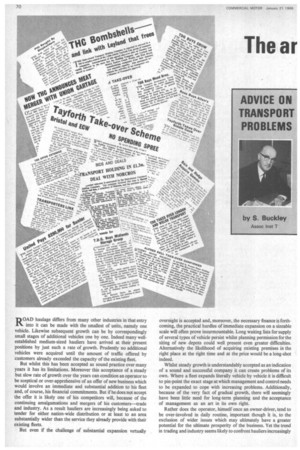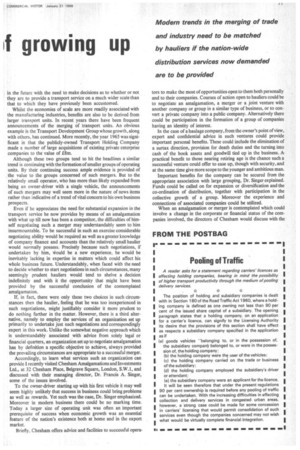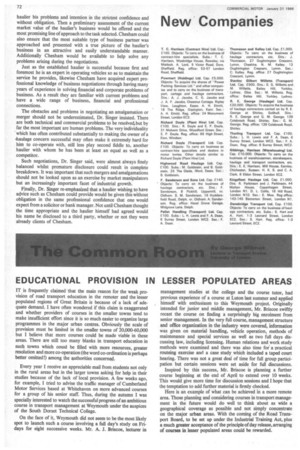The ar If growing up
Page 72

Page 73

Page 74

If you've noticed an error in this article please click here to report it so we can fix it.
ROAD haulage differs from many other industries in that entry into it can be made with the smallest of units, namely one vehicle. Likewise subsequent growth can be by correspondingly small stages of additional vehicles one by one. Indeed many wellestablished medium-sized hauliers have arrived at their present positions by just such a rate of growth. Prudently no additional vehicles were acquired until the amount of traffic offered by customers already exceeded the capacity of the existing fleet.
But whilst this has been accepted as sound practice over many years it has its limitations. Moreover this acceptance of a steady but slow rate of growth over the years can condition an operator to be sceptical or over-apprehensive of an offer of new business which would involve an immediate and substantial addition to his fleet and, of course, his financial commitments. But if he does not accept the offer it is likely one of his competitors will, because of the continuing amalgamations and mergers of his customers—trade and industry. As a result hauliers are increasingly being asked to tender for either nation-wide distribution or at least to an area substantially Wider than the service they already provide with their existing fleets.
But even if the challenge of substantial expansion virtually overnight is accepted and, moreover, the necessary finance is forthcoming, the practical hurdles of immediate expansion on a sizeable scale will often prove insurmountable. Long waiting lists for supply of several types of vehicle persist whilst planning permission for the siting of new depots could well present even greater difficulties. Alternatively the likelihood of acquiring existing premises in the right place at the right time and at the price would be a long-shot indeed.
Whilst steady growth is understandably accepted as an indication of a sound and successful company it can create problems of its own. Where a fleet expands literally vehicle by vehicle it is difficult to pin-point the exact stage at which management and control needs to be expanded to cope with increasing problems. Additionally, because of the very fact of gradual growth, there will seemingly have been little need for long-term planning and the acceptance of management as an art in its own right.
Rather does the operator, himself once an owner-driver, tend to be over-involved in daily routine, important though it is, to the exclusion of wider issues which may ultimately have a greater potential for the ultimate prosperity of the business. Yet the trend in trading and industry seems likely to confront hauliers increasingly in the future with the need to make decisions as to whether or not they are to provide a transport service on a much wider scale than that to which they have previously been accustomed.
Whilst the economies of scale are more readily associated with the manufacturing industries, benefits are also to be derived from larger transport units. In recent years there have been frequent announcements of the merging of transport units. An obvious example is the Transport Development Group whose growth, along with others, has continued. More recently, the year 1965 was significant in that the publicly-owned Transport Holding Company made a number of large acquisitions of existing private enterprise companies to the value of Um, Although these two groups tend to hit the headlines a similar trend is continuing with the formation of smaller groups of operating units. By their continuing success ample evidence is provided of the value to the groups concerned of such mergers. But to the relatively small operator, who has more than likely expanded from being an owner-driver with a single vehicle, the announcements of such mergers may well seem more in the nature of news items rather than indicative of a trend of vital concern to his own business prospects.
Even if he appreciates the need for substantial expansion in the transport service he now provides by means of an amalgamation with what up till now has been a competitor, the difficulties of himself negotiating such a merger may understandably seem to him insurmountable. To be successful in such an exercise considerable negotiating ability would be required as well as a greater knowledge of company finance and accounts than the relatively small haulier would normally possess. Precisely because such negotiations, if undertaken by him, would be a new experience, he would be inevitably lacking in expertise in matters which could affect his whole business future. Understandably, when faced with the need to decide whether to start negotiations in such circumstances, many seemingly prudent hauliers would tend to shelve a decision indefinitely and with it the opportunity that might have been provided by the successful conclusion of the contemplated amalgamation.
If, in fact, there were only these two choices in such circumstances then the haulier, feeling that he was too inexperienced in such negotiations, might justifiably consider it more prudent to do nothing further in the matter. However, there is a third alternative, namely to employ the services of an organization set up primarily to undertake just such negotiations and correspondingly expert in this work. Unlike the somewhat negative approach which is understandably associated with advice from solely legal or financial quarters, an organization set up to negotiate amalgamation has by definition a specific objective to achieve, always provided the prevailing circumstances are appropriate to a successful merger.
Accordingly, to learn what services such an organization can provide I recently visited Chesham Amalgamations and Investments Ltd., at 32 Chesham Place, Belgrave Square, London, S.W.1, and discussed with their managing director, Dr. Francis A. Singer, some of the issues involved.
To the owner-driver starting up with his first vehicle it may well seem highly unlikely that success in business could bring problems as well as rewards. Yet such was the case, Dr. Singer emphasized. Moreover in modern business there could be no marking time. Today a larger size of operating unit was often an important prerequisite of success when economic growth was an essential feature of the nation's existence both at home and in the export market.
Briefly. Chesham offers advice and facilities to successful opera
tors to make the most of opportunities open to them both personally and to their companies. Courses of action open to hauliers could be to negotiate an amalgamation, a merger or a joint venture with another company or group in a similar type of business, or to convert a private company into a public company. Alternatively there could be participation in the formation of a group of companies having an identity of interest.
In the case of a haulage company, from the owner's point of view, expert and confidential advice in such ventures could provide important personal benefits. These could include the elimination of a surtax direction, provision for death duties and the turning into cash of the book assets and goodwill tied up in the business. k practical benefit to those nearing retiring age is the chance such a successful venture could offer to ease up, though with security, and at the same time give more scope to the younger and ambitious man.
Important benefits for the company can be secured from the appropriate association with large grouping, Dr. Singer explained. Funds could be called on for expansion or diversification and the co-ordination of distribution, together with participation in the collective growth of a group. Moreover the experience and connections of associated companies could be utilized.
When an amalgamation or merger is contemplated which could involve a change in the corporate or financial status of the companies involved, the directors of Chesham would discuss with the
haulier his problems and intention in the strictest confidence and without obligation. Then a preliminary assessment of the current market value of the haulier's business would be offered and the most promising line of approach to the task selected. Chesham could also ensure that the most suitable type of business partner was approached and presented with a true picture of the haulier's business in an attractive and easily understandable manner. Additionally Chesham would be available to help solve any problems arising during the negotiations.
Just as the established haulier is successful because first and foremost he is an expert in operating vehicles so as to maintain the service he provides, likewise Chesham have acquired expert professional knowledge of business negotiations through having many years of experience in solving financial and corporate problems of business. As a result they are familiar with current problems and have a wide range of business, financial and professional connections.
The obstacles and problems in negotiating an amalgamation or merger should not be underestimated, Dr. Singer insisted. There are both technical and commercial problems to be resolved,but by far the most important are human problems. The very individuality 'which has often contributed substantially to making the owner of a 'haulage concern successful may often make it extremely hard for him to co-operate with, still less play second fiddle to, another haulier with whom he has been at least an equal as well as a competitor.
Such negotiations, Dr. Singer said, were almost always finely balanced whilst premature disclosure could result in complete breakdown. It was important that such mergers and amalgamations should not be looked upon as an exercise by market manipulators but an increasingly important facet of industrial growth.
Finally, Dr. Singer re-emphasized that a haulier wishing to have advice such as Chesham could provide would be given this without obligation in the same professional confidence that one would expect from a solicitor or bank manager. Not until Chesham thought the time appropriate and the haulier himself had agreed would his name be disclosed to a third party, whether or not they were already clients of Chesham.




















































































































